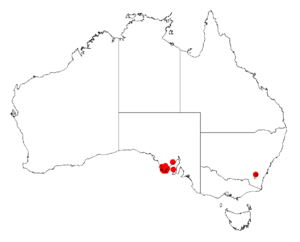Gill's wattle facts for kids
Quick facts for kids Gill's wattle |
|
|---|---|
| Scientific classification | |
| Genus: |
Acacia
|
| Species: |
gillii
|
 |
|
| Occurrence data from AVH | |
Acacia gillii, also known as Gill's wattle, is a special type of shrub. It belongs to a big family of plants called Acacia. You can find this plant growing in some parts of southern Australia. It was named after an Austrian plant expert, Alexander Gilli.
What Gill's Wattle Looks Like
This shrub usually grows to be about 2 to 4 m (6 ft 7 in to 13 ft 1 in) tall. That's like two to four times your height! It has a loose, open shape with branches that hang down. Its small branches are smooth and dark reddish-brown.
The leaves of Gill's wattle are called phyllodes. They are always green and shaped like a narrow spear. These phyllodes can be 6 to 17.5 cm (2.4 to 6.9 in) long and 6 to 15 mm (0.24 to 0.59 in) wide. They have clear edges and a strong line down the middle.
When it flowers, Gill's wattle has round flower-heads. Each head is packed with 43 to 72 bright golden flowers. After the flowers, long, thin brown seed pods grow. These pods can be up to 17 cm (6.7 in) long and 5 to 7 mm (0.20 to 0.28 in) wide. Inside, they hold dull black seeds that are about 4.5 to 6 mm (0.18 to 0.24 in) long.
How Gill's Wattle Was Named
Two plant experts, Joseph Maiden and William Blakely, first officially described this plant in 1927. They wrote about it in a scientific journal. Later, in 2003, another botanist named Leslie Pedley gave it a different scientific name, Racosperma gillii. But in 2006, it was moved back to the Acacia group.
Gill's wattle is part of a group of plants similar to Acacia microbotrya. It also looks a bit like Acacia retinodes and Acacia cretacea.
Where Gill's Wattle Grows
You can find Gill's wattle in a small area of South Australia. It grows in the southern part of the Eyre Peninsula. This includes places near Port Lincoln and Ungarra.
It likes to grow in clay or loamy soils. You'll often see it in open scrub areas. It grows alongside other plants like Eucalyptus diversifolia and Eucalyptus phenax.

